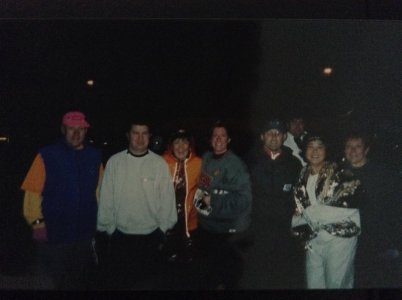Which training approach do you follow?
I’m with the Galloway customized program that requires a full race rehearsal and doing all the long distances regardless if it takes long time.
Many people have done it and succeded.
Reading the notes on the other thread of caping training at 3 hours and not going beyond 13 ish miles..
Then I wonder if this second one could be a “safer” route to prevent injuries..?
Appreciate your thoughts, thanks!
I used the Galloway method for my first Half Marathon in 2011 and continued using it through the 2018 Star Wars Dark Side Challenge. At that point, the thoughts of ever attempting the marathon had begun to change from no way, never happening to maybe this is something I want to take on.
However, as a member of team not so fast, I had zero desire whatsoever to put in the weekly long run his marathon plan called for. So for a local 2018 Half Marathon, I tried a
@DopeyBadger plan that involved more longer runs during the week so I could have a manageable long run on the weekend instead of 4-6 hour long run. Despite an extremely difficult race slog, I managed to knock 3 minutes off my 7 year old PR at that point. I was sold.
I continue to use the Galloway principles of run/walk/run in both training and racing. I learned a lot from the Galloway method and never would have come to where I am today without it.
The training plans that cap the long run at 3 miles typically make use of an accumulated fatigue approach. While you only go out to ~3 hours for a max long run, the remainder of the plan is set up to ensure that you're doing those 3 hours on tired legs. As @DopeyBadger likes to say, don't think of it as just doing the first 13 miles or so of a race, think of it as running miles 13-26 because your legs are tired from the rest of the running that you've done during the week.
Personally, I prefer spreading my mileage out throughout the week instead of leaning so heavily on the long run of the Galloway plan. Both training philosophies work with run/walk, too.
I too prefer spreading my mileage out during the week. It's easier to run 90 minutes one or two days during the week than have to run 4 or 5 hours on the weekend.
Last October, I spent a week in the hospital with pneumonia and missed an entire month of training for Dopey to Dumbo. I had to modify the plan and cut out some longer runs, but even then I ran my first or second fastest marathon ever and finished all 3
Disneyland races one week later.
So excited for all you first time marathoners! I went from thinking I'd never do one to "IF I do, it'll be at Disney" and I'm so so glad I followed through. I'm training for my 4th marathon and third Dopey, and I've definitely not gotten any faster.
My advice: lean on this forum for training support and join the meetups at MW! After gutting through my first marathon alone (the notoriously hot 2020 race), I found my rD BFF through this group and we ended up running together almost by accident. I'm not sure if I'd have gotten through my two Dopey marathons without @Herding_Cats

I'm counting on her (and all of you) for this next one, but also looking to pay it forward!
Similar here. I went from I will never run a marathon to first marathon as a part of Dopey. I never would have gotten to this point if not for the encouragement and support of so many on these boards, many of whom I've never met. During the hardest moments of the marathon, I remembered the words of so many here preparing me for what was to come.
On the morning of my first Disney half marathon I was sitting in the corrals trying to figure out what in the heck I'd gotten myself into.
I let those feelings get the best of me before my first half marathon as well. Took me 2 more races to discover that I actually enjoyed races. A few years later after some training adjustments, I came to learn that I loved running as well. To all the first timers of any distance, remember to trust your training.
And if you start to struggle with something during that training, please do not repeat the mistakes I made training for my first half. Reach out to people and ask questions. You'll get some great answers. You'll get encouragement, and you will know you're not alone in this. I'm still very much on team not so fast. I'm also a 5 time Dopey finisher. Speed is less important than your desire to put the work in and prepare.
BYU Hall of Fame football coach LaVell Edwards said "the will to prepare is more important than the will to win." When the mileage mounts and the fatigue sets in during the marathon, around mile 22 or 23, I tell myself "I have ran these 3-4 miles multiple times a week for many months now. I know how to run these miles because I practiced running them every time I didn't want to go out for a run."

 Me too!
Me too!

